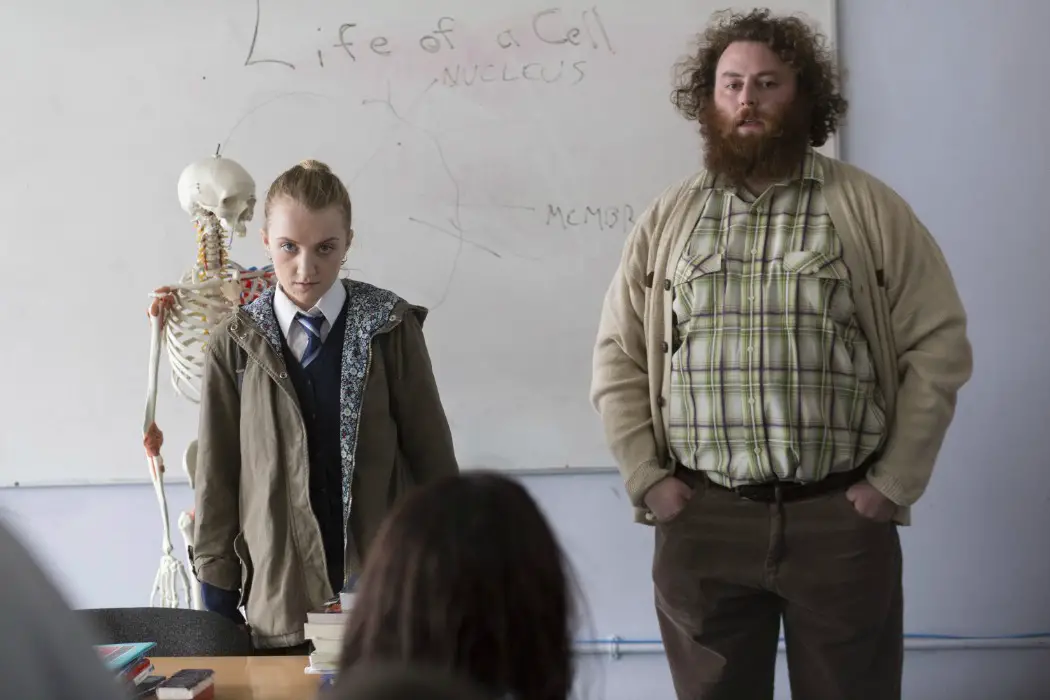MY NAME IS EMILY: Almost Charming Enough To Outrun Its Self-Importance

My Name Is Emily is one of those movies that bites off a little bit more than it can chew. It tries so hard to be intellectual and charming at the same time, mostly succeeding at the latter while beating us over the head with the former. In fact, it would have been far more thought-provoking if the writers could have gotten out of their own way to let the genuinely compelling themes of the story shine through. Fortunately, it makes up for its aloofness and pseudo-poetry by sprinkling in just the right amount of quirkiness and charisma.
What did My Name Is Emily do right?
My Name Is Emily takes a genre that’s usually low-stakes comedy and turns it into a moving, enjoyable story. Despite our main characters being saddled with some really clumsy, heavy-handed dialogue, we really care about Emily (Evanna Lynch) finding her father, and we really care about Arden (George Webster) and Emily’s friendship. Even if we don’t quite like our titular character, we at least root for her.

While Emily’s preachiness and abrasiveness are unfortunately her defining character traits, the movie’s flashbacks are powerful and compelling in showing us how she turned out that way. The scenes that take place in the past are far more convincing, both emotionally and informationally, than any “current day” scenes. These flashbacks tug all the right heartstrings, and more importantly, they give Emily a pass for being detached and standoffish all the time.
My Name Is Emily impressively avoids the trap that similar movies fall into so often: it doesn’t come out and tell you what you’re supposed to feel about the story. It’s a good thing, too, because there are a lot of well-done elements that will speak to people in different ways. Parents, young adults, people whose lives have been affected by mental illnesses, and people who have lost parents will all identify with this movie in vastly different ways – and all of them are free to do so because we don’t have a character clumsily telling us how to feel at some point near the emotional climax of the story.

Finally, amidst all of the pseudo-intellectual ramblings about why we smile in photographs and facts just being points of view, there’s actually some decent stuff in there. For example, Dr. Golding’s (Barry McGovern) take on Robert’s (Michael Smiley) mental illness is unique and insightful. In this scene, the doctor compares Robert to the philosopher in Plato’s allegory of the cave – but crucially, he builds on the allegory, offering something new and refreshing instead of simply rehashing a tired cliché. This is exactly what the movie needed more of.
What did My Name Is Emily do wrong?
There’s really only one thing wrong with My Name Is Emily (which unfortunately persists throughout the entire movie): it takes itself just a bit too seriously. It’s already a nuanced, touching story with some great moments and thought-provoking themes – but it’s trying so hard to tell us that it’s deep and edgy that it ends up being scattered and exhausting.
The movie has a fairly simple plot that revolves around just three people, which should leave plenty of room for good character development. Unfortunately, Emily fills that space by doing things like lecturing Arden about points of view, or explaining to her English class that they don’t really understand William Wordsworth. She’s always trying to be smarter than everyone else, much to the disdain of her English teacher, Arden, and the audience.
Ultimately, the movie and the main character suffer from the same issue: they’re extremely concerned with coming across as smart and provocative. This might have worked better if they didn’t dwell so often on things you might have learned in your freshman year “Introduction to Philosophy” course. Of course, a coming-of-age movie is not at all obliged to being intellectually groundbreaking; but when a film is as philosophically ambitious as this one is, a lack of profoundness is especially damning.

All of this might have been forgivable if it weren’t for the soundtrack. Our ears are constantly being bombarded with a vanilla, melancholy indie tune played over some close-ups of grass, or telephone wires, or passing landscapes. I counted literally ten instances of this exact thing occurring, which works out to approximately once every nine minutes, which is maybe a bit much. The thing is, the story was compelling and thoughtful enough to create this atmosphere on its own, so it really didn’t need to blast something like a “Rainy Coffee Shop” Spotify playlist to make us feel that way.
Finally, and this isn’t something that My Name Is Emily does wrong so much as something that Arden does wrong, but… in the beginning Arden gets Emily a birthday present because he “wants her to feel better.” He brings her The Grapes of Wrath. Not a happy book about adventure or redemption. Not a Shakespearean comedy. The Grapes of Wrath. Does he watch Schindler’s List to cheer himself up? Did he read Old Yeller to make himself feel better after his dog died? Come on Arden!
Conclusion
At the core of this movie, there’s a genuinely compelling, touching tale about a daughter’s search for her father and the relationship she builds along the way. There’s so much packed in to the story, from parental and familial relationships, to mental health and its perception, to personal identity – it’s great stuff! But we’re hardly allowed to dwell on it because in seemingly every other scene, Emily is lecturing us about whatever pseudo-intellectual ramblings she happens to have on her mind. While this does detract from the movie’s charm and authenticity, it doesn’t entirely negate what is otherwise a poignant, stirring story.
That’s enough from me – did you take something different from My Name Is Emily? Is Emily smarter than you are? Is My Name is Emily smarter than you are? Let us know in the comments!
My Name Is Emily opened in Ireland in April 2016 and is available in a limited theatrical release in the US as of February 17.
Does content like this matter to you?
Become a Member and support film journalism. Unlock access to all of Film Inquiry`s great articles. Join a community of like-minded readers who are passionate about cinema - get access to our private members Network, give back to independent filmmakers, and more.













